
 |
||||||||

| Tracks 1-21 | ||||||||||||||||||||||||||||||||||||||||||||
|
— Kenneth B Schwartz
Shortly before his death from lung cancer at age 40 in September of 1995, Kenneth B Schwartz established an organization dedicated to strengthening the relationship between patients and caregivers in the changing healthcare system. Ken viewed the Center as a vehicle to advance the ideas, hopes, and concerns that he expressed in his article, ‘‘A Patient’s Story,’’ published on July 16, 1995, in The Boston Globe Magazine....
During his ten-month ordeal, Mr Schwartz came to realize that what matters most when a medical issue arises — whether for ourselves or a loved one — is the “human connection” between patients and healthcare professionals. This special Roundtable discussion is dedicated to the Schwartz Center, a multidisciplinary forum in which caregivers discuss difficult emotional and social issues that arise in caring for patients. More than 26,000 clinicians at 129 sites in 26 states participate in these interactive discussions and share their experiences, thoughts and feelings on a variety of topics.
SOURCE: www.theschwartzcenter.org
Select Excerpts from the Discussion
Tracks 1-21
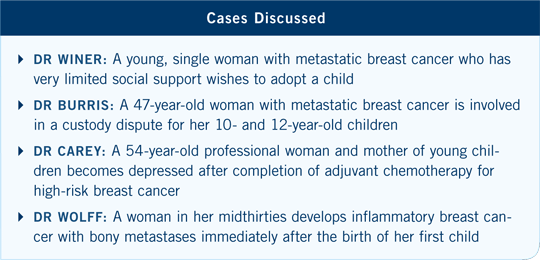
![]() DR CAREY: I introduce the hospice discussion early. Each time we make a decision on active therapy versus symptom management, I remind patients that their condition isn’t curable and that when they’re tired of treatment, we can move on to simply managing their symptoms. I don’t want it to be a surprise when I suggest that maybe it’s time to stop active treatment.
DR CAREY: I introduce the hospice discussion early. Each time we make a decision on active therapy versus symptom management, I remind patients that their condition isn’t curable and that when they’re tired of treatment, we can move on to simply managing their symptoms. I don’t want it to be a surprise when I suggest that maybe it’s time to stop active treatment.
![]() DR BURRIS: Every Monday, after the weekend call, a little confrontation arises in our group because some clinicians can’t talk to their patients about hospice. I have some colleagues whose patients are on hospice for 1.5 days. Hospice should be a six-week experience at a minimum, and it’s meant to be up to six months or longer.
DR BURRIS: Every Monday, after the weekend call, a little confrontation arises in our group because some clinicians can’t talk to their patients about hospice. I have some colleagues whose patients are on hospice for 1.5 days. Hospice should be a six-week experience at a minimum, and it’s meant to be up to six months or longer.
![]() DR WOLFF: The national average for the amount of time patients are in hospice is approximately three days.
DR WOLFF: The national average for the amount of time patients are in hospice is approximately three days.
It takes five minutes to say, “Your cancer has progressed. Let’s change treatment.” It takes an hour to say, “Your cancer has progressed. Maybe it is time to stop doing treatment.”
Sometimes we have not had those conversations until that moment. We can start conversations earlier about how far we may go, but that’s easier said than done.
![]() DR WINER: We need to discuss, set and recalibrate expectations with the patient along the way. That requires spending a good deal of time on many different occasions talking to our patients about where they are in their trajectory.
DR WINER: We need to discuss, set and recalibrate expectations with the patient along the way. That requires spending a good deal of time on many different occasions talking to our patients about where they are in their trajectory.
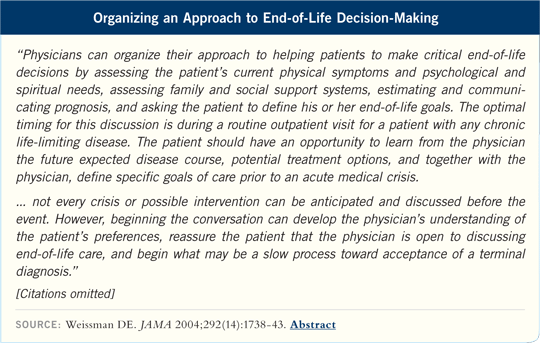
![]() DR BURRIS: I have witnessed some colleagues lately who made me think, “I don’t want to end up practicing oncology like that.” They make business relationships with patients and quit having the personal interaction. Some become guarded. I believe the oncologists who handle their practices in a healthy fashion appreciate how short life is and the need to take advantage of what you can while you’re here.
DR BURRIS: I have witnessed some colleagues lately who made me think, “I don’t want to end up practicing oncology like that.” They make business relationships with patients and quit having the personal interaction. Some become guarded. I believe the oncologists who handle their practices in a healthy fashion appreciate how short life is and the need to take advantage of what you can while you’re here.
![]() DR WINER: I work out religiously — for my brain, not my body. Work creeps into my life at many hours of the day and night, but I also really enjoy what I do. It helps to have colleagues to talk to who deal with the same problems. If you wall yourself off from patients, then I believe you burn out. Dealing with some of these challenging issues and getting to know patients help protect you because you feel that you’re doing the best job you can.
DR WINER: I work out religiously — for my brain, not my body. Work creeps into my life at many hours of the day and night, but I also really enjoy what I do. It helps to have colleagues to talk to who deal with the same problems. If you wall yourself off from patients, then I believe you burn out. Dealing with some of these challenging issues and getting to know patients help protect you because you feel that you’re doing the best job you can.
![]() DR WOLFF: One of the key issues in taking care of myself is to try to enjoy what I do. In many cases, we are helping people survive. In other cases, we are not, but we are helping them and their families cope with a difficult situation. Diversity in my work also helps, as does having a balanced life in terms of exercise, physical activity and time with my family.
DR WOLFF: One of the key issues in taking care of myself is to try to enjoy what I do. In many cases, we are helping people survive. In other cases, we are not, but we are helping them and their families cope with a difficult situation. Diversity in my work also helps, as does having a balanced life in terms of exercise, physical activity and time with my family.
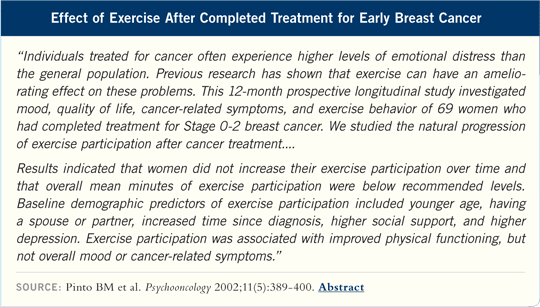
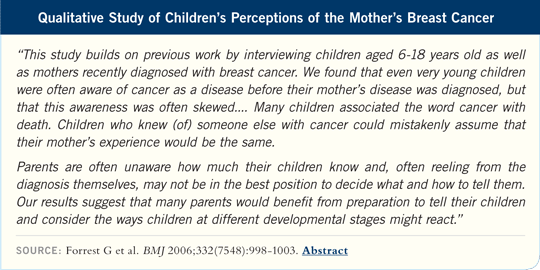
![]() DR WINER: How kids fare depends on how the parents cope with their experiences.
I often tell people this is why they need to obtain help and support for themselves. The better shape they are in psychologically, the better the kids will adjust to these difficult situations. One good reason to try to get their act together emotionally and psychologically is that their kids will do much better, not only while they’re sick but years afterwards. When secrets are held in the family and communication is poor, the kids feel it and everything falls apart.
DR WINER: How kids fare depends on how the parents cope with their experiences.
I often tell people this is why they need to obtain help and support for themselves. The better shape they are in psychologically, the better the kids will adjust to these difficult situations. One good reason to try to get their act together emotionally and psychologically is that their kids will do much better, not only while they’re sick but years afterwards. When secrets are held in the family and communication is poor, the kids feel it and everything falls apart.
![]() DR CAREY: Many of our patients don’t have their young children participate
actively in their care, and I generally advocate against that. I believe the pediatric oncologists are much more thoughtful about these issues, and they have found that children fare much better with honesty. What children invent in their heads, if you try to protect them, is worse than the reality. In general, they tend to feel better if they’re participants in the process. In my own clinical experience, when the parents do include the children, the function of the family seems to be better overall.
DR CAREY: Many of our patients don’t have their young children participate
actively in their care, and I generally advocate against that. I believe the pediatric oncologists are much more thoughtful about these issues, and they have found that children fare much better with honesty. What children invent in their heads, if you try to protect them, is worse than the reality. In general, they tend to feel better if they’re participants in the process. In my own clinical experience, when the parents do include the children, the function of the family seems to be better overall.
![]() DR CAREY: Among patients completing adjuvant therapy, subclinical and clinical depression are far more common than we have recognized. Data from the psychiatric literature suggest that a form of post-traumatic stress disorder occurs in many patients. However, it has not been established how aggressive we need to be in diagnosing and treating this condition. I know a psychologist who works with many of my patients and is especially attuned to these issues. Often my patients see her for a few months after completing adjuvant therapy.
DR CAREY: Among patients completing adjuvant therapy, subclinical and clinical depression are far more common than we have recognized. Data from the psychiatric literature suggest that a form of post-traumatic stress disorder occurs in many patients. However, it has not been established how aggressive we need to be in diagnosing and treating this condition. I know a psychologist who works with many of my patients and is especially attuned to these issues. Often my patients see her for a few months after completing adjuvant therapy.
![]() DR BURRIS: Some patients don’t want to think about their cancer, but a substantial proportion of patients would just as soon come in every month and ask, “What can I do now?” Without a magic prevention pill, diet and exercise seem to be solid with regard to enhancing immune system functioning.
DR BURRIS: Some patients don’t want to think about their cancer, but a substantial proportion of patients would just as soon come in every month and ask, “What can I do now?” Without a magic prevention pill, diet and exercise seem to be solid with regard to enhancing immune system functioning.
![]() DR CAREY: I have patients who engage in exercise and lifestyle modifications, but I advise them that I don’t know that it will affect their breast cancer recurrence
risk and that they are not in charge of whether their disease comes back.
DR CAREY: I have patients who engage in exercise and lifestyle modifications, but I advise them that I don’t know that it will affect their breast cancer recurrence
risk and that they are not in charge of whether their disease comes back.
![]() DR WINER: The syndrome of falling apart or having a hard time at the end of adjuvant treatment should not be viewed as the exception. It happens with the majority of patients and is the result of transitioning to a time when they’re receiving less support from us, seeing us less frequently, no longer focused on completing treatment. Their personal problems, put aside during therapy, can come crashing back when treatment is completed.
DR WINER: The syndrome of falling apart or having a hard time at the end of adjuvant treatment should not be viewed as the exception. It happens with the majority of patients and is the result of transitioning to a time when they’re receiving less support from us, seeing us less frequently, no longer focused on completing treatment. Their personal problems, put aside during therapy, can come crashing back when treatment is completed.
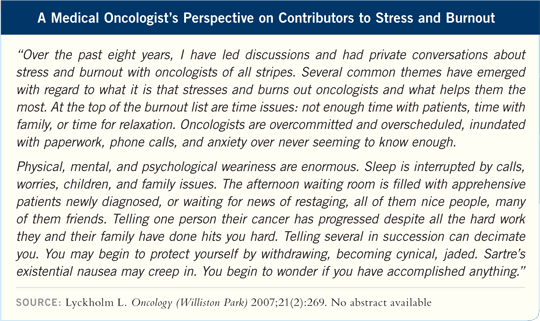
EDITOR'S NOTE
Another perspective on metastatic breast cancer
Neil Love, MD
- Select publications
INTERVIEWS
Larry Norton, MD
- Select publications
John Mackey, MD
- Select publications
Charles E Geyer Jr, MD
- Select publications
Roundtable Discussions
- Select publications
Breast Cancer Update:
A CME Audio Series and Activity